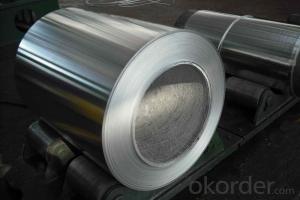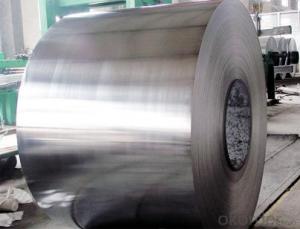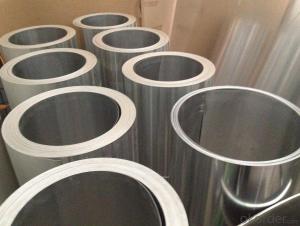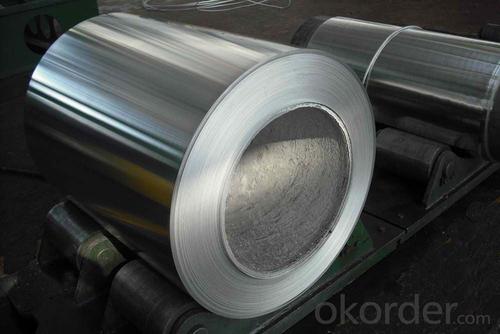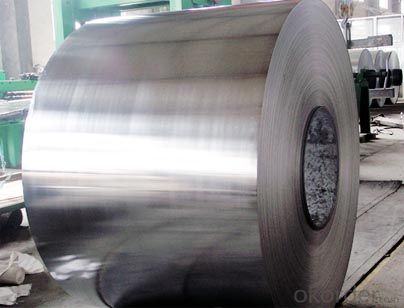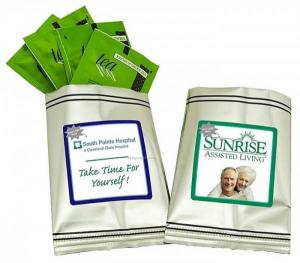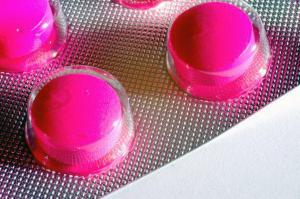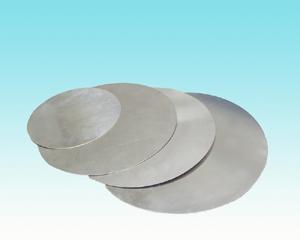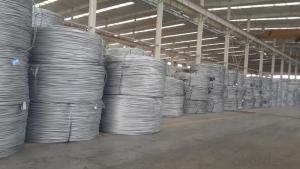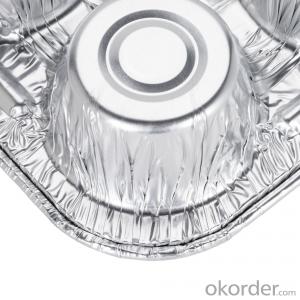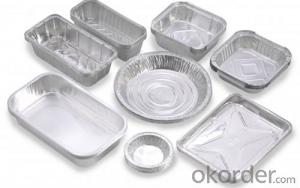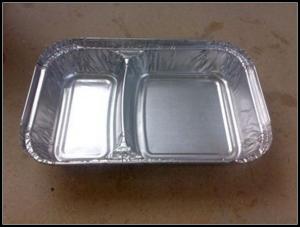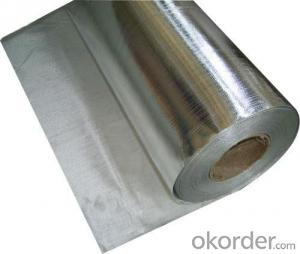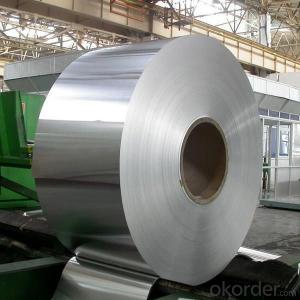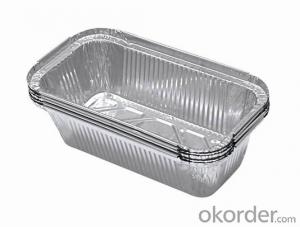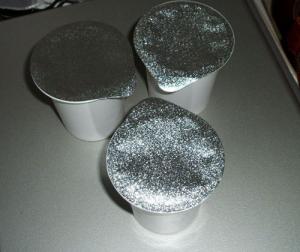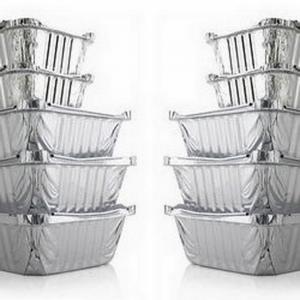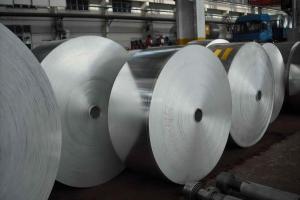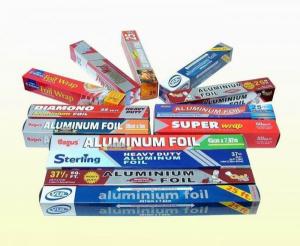Aluminum Color Coated Aluminium Coil and Aluminium Foil for Food Container Alloy 8011H22
- Loading Port:
- Shanghai
- Payment Terms:
- TT OR LC
- Min Order Qty:
- 5 m.t.
- Supply Capability:
- 100000 m.t./month
OKorder Service Pledge
OKorder Financial Service
You Might Also Like
Specification
Product Description
Commodity: Aluminum coil jumbo rolls
Alloy: 1050/1060/1100/1200/3003/3004/3005/3105/5005/5052/5754/5083/6061/8011
Temper: O, H12,H14,H16,H18,H22,H24,H32,H112,T6
Gauge: 0.2mm-8mm
CC and DC material with higher tensile strength and bigger elongation
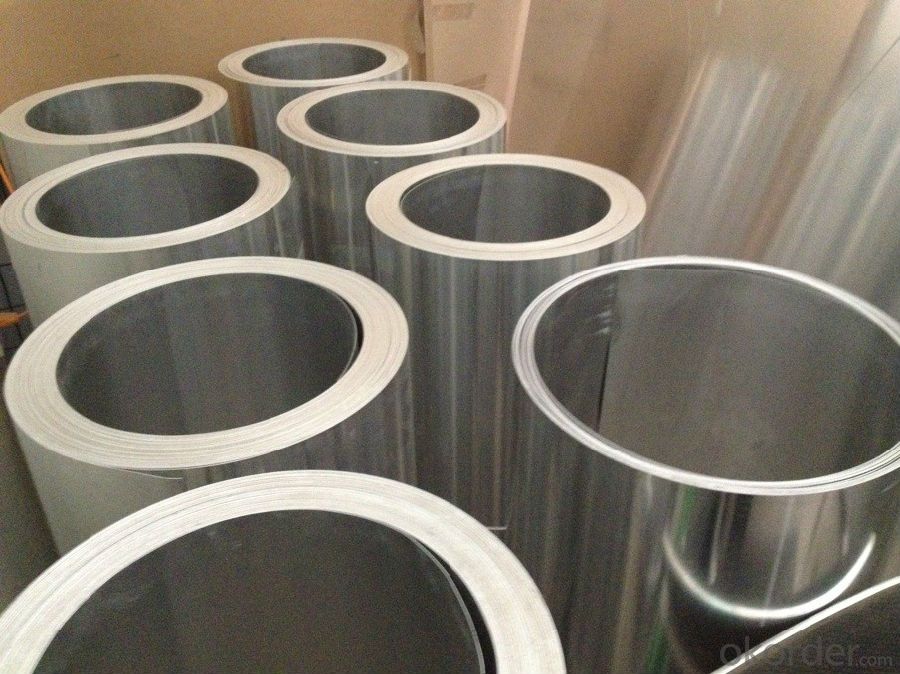
Aluminum Coil - Packaging
Standard Packaging
- Vertical axis packaging
- Core types: Fiber, Aluminum, Steel, Plastic
- Inner Diameter (ID) as required
- Outside Diameter (OD) as required
- Inserts as required
- Separators as required - cardboard or wooden slates
- Wooden Pallets or Crates
Custom Packaging
- Custom packaging, coil weights, inner diameters and outer diameters are available upon request.
Export Packaging
- Export packaging in conformance with IPPC International Standards is available upon request.
Aluminum Coil - Custom Finishes
Painting, Anodizing and Other Coatings
- Polyester, Acrylic, Silicone Polyester, Kynar (Flouropolymer), Krystal Kote, etc.
- All colors and gloss levels.
- One-side or two sides.
Aluminum Coil - Special Processing
- Cut-to-Length
- Tension Leveling
- Paper Interleaving
- Fine grain, minimum earring, anodizing quality
Our main products for aluminum coils are as follows:
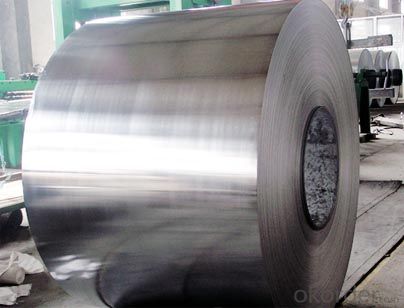
Alloy | Thickness(mm) | Width(mm) | Temper | DC & CC |
1050,1060,1070,1100,1235 | 0.1-10.0 | 25-2200 | O,H12,H14,H16,H18,H22,H24,H26,H32,H34 | DC, CC |
2.5-10.0 | 950-2300 | F, H111,H112 | DC | |
3003,3004,3102,3104 | 0.1-10.0 | 25-2200 | O,H12,H14,H16,H18,H22,H24,H26,H32,H34 | DC, CC |
2.5-10.0 | 950-2300 | F, H111,H112 | DC | |
5052,5083,5754,5005,5182 | 0.1-10.0 | 25-2200 | O,H12,H14,H16,H18,H22,H24,H26,H32,H34 | DC |
2.5-10.0 | 950-2200 | F,H111,H112 | DC | |
8011,8079 | 0.1-10.0 | 25-2300 | O,H12,H14,H16,H18,H22,H24,H26,H32,H34 | DC,CC |
Application | Mainly in printing(PS plate base), Aluminum-plastic composite panel base, construction, decoration, capacitor, cover material, deep drawing products, refrigeration, air conditioner, automobile etc. | |||
Our Services
CNBM is ready to assist with any product needs or enquiries. We value our customers and welcome your thoughts and feedback.
Please send comments, questions and requests through alibaba or our personal contact so they can be directed to the appropriate department.
About samples: Based on our company rules, a few samples are willing to be offered, but clients are requested to pay freight.
Working time:9:00~17:30(GM+8) from Monday to Friday, but you also can contact with us via personal contact information during our leisure time. We will try our best to offer you service in 24*7 hours.
Any quality, quantity problems are occured, response you will get in time not over more 24 hours after we recieve your complains. Problems will be solved in one week throught friendly negotiation.
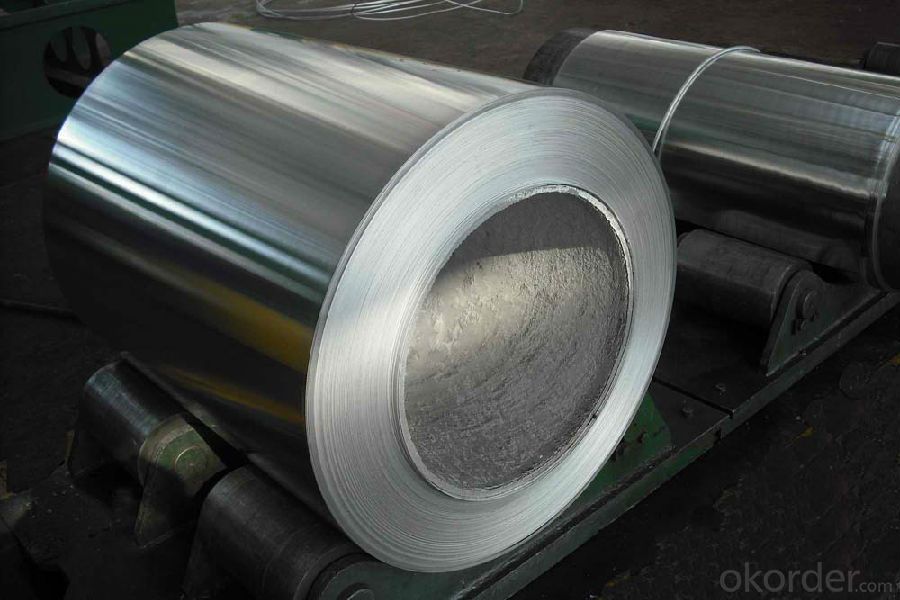
- Q: This question asks for methods to prevent aluminum from seeping into food when cooking with aluminum cookware.
- <p>To prevent aluminum from leaching into food when using aluminum cookware, follow these guidelines: Avoid using aluminum cookware for acidic foods or beverages, as acids can cause aluminum to leach. Do not cook with high heat, as this can increase the risk of leaching. Use a protective coating, such as a non-stick coating or a thin layer of oil, to create a barrier between the food and the aluminum. Regularly replace or repair any damaged cookware to prevent exposure to bare aluminum. Finally, consider using alternative cookware materials, such as stainless steel or cast iron, for long-term cooking and storage.</p>
- Q: What precautions should be taken when dealing with aluminum food containers to ensure safety?
- <p>When handling aluminum food containers, it's important to ensure they are food-grade and free from any damage or sharp edges. Always wash them thoroughly before use, and avoid using abrasive cleaners that could scratch the surface. Do not store acidic or alkaline foods in aluminum containers for extended periods as this can cause leaching of aluminum into the food. Also, avoid heating aluminum containers in a microwave as it can cause warping and potential chemical reactions. Use caution when disposing of aluminum containers to recycle them properly and minimize environmental impact.</p>
- Q: What is the oxide layer that forms on aluminum and what are its properties?
- <p>The oxide layer on aluminum is a thin, transparent, and hard layer of aluminum oxide (Al2O3) that forms naturally when aluminum is exposed to air. This layer is highly resistant to corrosion and protects the underlying aluminum from further oxidation. It is chemically inert, which means it does not react easily with other substances, and it has a high melting point, making it stable at high temperatures. The oxide layer also has a high hardness, which helps to prevent scratching and wear. This protective oxide layer is self-healing, meaning that if it is damaged, it can regenerate and continue to protect the aluminum.</p>
- Q: What is the reaction of aluminum with alkaline solutions and what products are formed?
- <p>Aluminum reacts with alkaline solutions in a process known as an acid-base reaction. When aluminum comes into contact with an alkaline solution, such as sodium hydroxide (NaOH), it forms sodium aluminate (NaAlO2) and hydrogen gas (H2). The reaction can be represented by the following chemical equation: 2Al + 2NaOH + 6H2O 鈫?2NaAl(OH)4 + 3H2. In this reaction, aluminum acts as an acid, donating protons to the hydroxide ions (OH-) from the alkaline solution, resulting in the formation of a salt and hydrogen gas.</p>
- Q: This question asks for various applications or purposes that can be served by using aluminum scrap material.
- <p>Aluminum scrap can be repurposed in numerous ways due to its recyclability and durability. Some alternative uses include manufacturing new aluminum products, such as cans, foil, and automotive parts. It can also be used in construction for materials like window frames and roofing. Additionally, aluminum scrap is utilized in the production of everyday items like bicycles, furniture, and even in some types of cookware. Furthermore, it can be employed in the aerospace industry for aircraft parts and in the electronics industry for components. Recycling aluminum scrap not only conserves resources but also reduces energy consumption and environmental impact.</p>
- Q: This question asks about the impact of aluminum on human health when it is ingested through food packaged in aluminum containers.
- <p>Aluminum is a common element found in the environment, and it is naturally present in small amounts in many foods. When food is packaged in aluminum, there is a possibility of trace amounts of aluminum leaching into the food, particularly in acidic foods. While the human body can handle small amounts of aluminum without harm, excessive intake over a long period may lead to potential health concerns. Aluminum has been associated with neurological disorders, although the evidence is not conclusive. It's important to note that the risk is generally low, as the body does not absorb a significant amount of aluminum from food or packaging. However, it is always recommended to follow food safety guidelines and use packaging materials that are deemed safe for food contact.</p>
- Q: The question seeks to understand the steps involved in producing aluminum, from raw material extraction to the final product.
- <p>The process of aluminum production involves several key steps. Initially, bauxite, the primary aluminum ore, is mined. This ore is then crushed and washed to remove impurities. The next phase is the Bayer Process, where bauxite is dissolved in a caustic soda solution under high temperature and pressure, resulting in a solution rich in aluminum hydroxide. This solution is then seeded with aluminum hydroxide crystals, causing more crystals to form, which are then harvested. The final step is the Hall-H茅roult Process, where the aluminum oxide is dissolved in a molten cryolite bath and electrolyzed to extract pure aluminum. This process involves passing an electric current through the bath, causing aluminum ions to be reduced at the cathode, forming molten aluminum which is then tapped off for further processing or use.</p>
- Q: What are some potential alternative uses for recycled aluminum that haven't been widely considered?
- <p>Recycled aluminum has a wide range of potential uses beyond the common ones like beverage cans and automotive parts. It can be used in the construction of buildings and infrastructure due to its strength and lightness. Additionally, it can be utilized in the aerospace industry for crafting aircraft components, given its resistance to corrosion and fatigue. In the electronics sector, recycled aluminum can be employed in the production of various components, such as circuit boards and casings. Moreover, it can be used in the creation of consumer goods like furniture, as well as in the packaging industry for food and pharmaceutical products. The versatility of recycled aluminum makes it a sustainable choice for many industries, reducing waste and environmental impact.</p>
- Q: Explain the various applications of aluminum in the construction industry.
- <p>Aluminum is widely used in building materials due to its lightweight, high strength, and corrosion resistance. It's utilized in window frames, doors, curtain walls, and roofing systems for its durability and energy efficiency. Aluminum's malleability allows it to be shaped into various forms, making it ideal for facades and decorative elements. It's also used in structural components like beams and columns, and in electrical wiring due to its excellent conductivity. Additionally, aluminum's sustainability makes it a preferred choice in green building practices, as it's recyclable and has a low environmental impact.</p>
- Q: What are the primary applications and benefits of aluminum in various industrial sectors?
- <p>Aluminum is extensively used in the industry due to its lightweight, high strength, and excellent corrosion resistance. It is a key material in the aerospace industry for aircraft construction to reduce weight and improve fuel efficiency. In the automotive sector, aluminum is used for engine parts and body panels to enhance fuel economy and performance. The construction industry utilizes aluminum for window frames, roofing, and structural components due to its durability and low maintenance. Aluminum is also prevalent in the packaging industry for food and beverage cans, and in electrical applications for wiring and transformers due to its high conductivity. Its recyclability makes it an environmentally friendly choice, further enhancing its industrial applications.</p>
Send your message to us
Aluminum Color Coated Aluminium Coil and Aluminium Foil for Food Container Alloy 8011H22
- Loading Port:
- Shanghai
- Payment Terms:
- TT OR LC
- Min Order Qty:
- 5 m.t.
- Supply Capability:
- 100000 m.t./month
OKorder Service Pledge
OKorder Financial Service
Similar products
Hot products
Hot Searches
